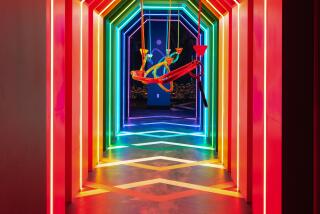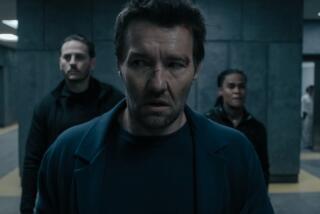Trapped in the web with Dave Eggersâ âThe Circleâ
From âBrave New Worldâ to âThe Hunger Games,â dystopian fiction generally presents a closed, ostensibly perfect society from the point of view of the outsider who doesnât fit in. The less-often told story is what itâs like to be part of the crowd. Who accepts the words of the powerful? What kind of person would that be?
Someone like Mae Holland, the main character in Dave Eggersâ new near-future novel, âThe Circle.â As a believer, her motivations are sometimes just beyond Eggersâ reach; whatâs more important is the role she plays as a functionary in an online company ravenous for data, with ambitions for tracking people that could make the National Security Agency quail.
Eggers is a literary polymath, a publisher of beautiful print books who launched the literary website McSweeneyâs Internet Tendency during the first dot-com boom, who used some of the proceeds from his bestselling 2000 memoir, âA Heartbreaking Work of Staggering Genius,â to start a literacy nonprofit, 826. He won the Los Angeles Times Book Prize innovatorâs award, partly for an edition of his print quarterly that tried to reimagine the newspaper.
Books: Sign up for our email newsletter
In his books, Eggers has reported stories and written fiction; after winning the Dayton Literary Peace Prize with his nonfiction chronicle âZeitoun,â he penned the novel âA Hologram for the King,â a 2012 National Book Award finalist. The latter, coupled with âThe Circle,â demonstrates two sides of the state of the contemporary economy, envisioned through individuals and their work.
Holland is an intelligent but naive 24-year-old who gets a job with the worldâs hottest Internet company, the Circle â a post-Facebook, post-Google behemoth that has taken over the market by uniting and parsing all individualsâ data. It likes video feeds too.
The Circle is an elite company with all the perks that todayâs Internet giants offer and more: A luxury campus with motivational sayings in the sidewalks, free meals. Visits from statesmen, musicians and Nobel Prize-winning scientists. Social and athletic and volunteer opportunities, state-of-the-art healthcare. And dorm rooms so staffers who stay late and start early need never leave.
And with it all, a true feeling of community â all 10,000 employees are eager Circle members, including Holland. When she learns that company staffers are ranked by their online and offline participation in Circle activities, she doesnât bristle: She works harder, stays later, and does whatever she can to make her score rise.
Holland initially has a few anchors outside of the Circle. An ex-boyfriend, Mercer, who makes chandeliers from humanely harvested deer antlers, doesnât like using the Internet. Her parents are decent and proud of her but largely disconnected from technology. Occasionally she takes a kayak out into the bay, an act so familiar and personal that she doesnât bring her smartphone along.
Hollandâs most significant act of individuality is with one of her two lovers, a man who is mysterious and possibly dangerous â mystery being almost impossible at the Circle. That affair draws her into a crisis at the heart of the book, which has an intriguing twist.
She wants to make the Circle her entire world. âOutside the walls of the Circle, all was noise and struggle, failure and filth,â Eggers writes. âBut here, all had been perfected. The best people had made the best systems and the best systems had reaped funds, unlimited funds, that made possible this, the best place to work. And it was natural that it was so, Mae thought. Who else but utopians could make a utopia?â
The problem is that utopias often mask other ambitions â for power, money, control. Two of the three men leading the Circle appear to be well intentioned: a hoodie-wearing, Mark Zuckerberg-like young genius and a beloved Steve Wozniak type, who is portly, jolly and accessible. The third, a power-suit-clad CEO, seems a necessary component of a successful business.
Holland advances at the Circle until she comes into contact with them, through one of its programs, round-the-clock video self-broadcasting directed at politicians. She coins a set of phrases for its promotion: SECRETS ARE LIES / SHARING IS CARING / PRIVACY IS THEFT.
Any resemblance to the WAR IS PEACE / FREEDOM IS SLAVERY / IGNORANCE IS STRENGTH trio from George Orwellâs â1984â is entirely intentional.
In â1984,â Winston knew not to believe this doublespeak; Eggers doesnât give Holland that insight. She is relentlessly wide-eyed and accepting; over and over she is lectured to, personally or as part of a group, and she assents without resistance. Itâs left to the reader to conclude that privacy may not be theft, but the right of members of a free society.
This seems like a promising narrative tactic, empowering the reader, but instead it squelches our conversation with the book. Holland nods or says yes; she doesnât have qualms or questions. The reader must slog alone through long didactic passages about the benefits of implanting tracking devices in children and covering the globe with surveillance cameras.
Eggers doesnât channel these creepy ideas enthusiastically enough to make them convincing, and theyâre not heightened enough to work as satire. (Although who could dream up a satire bigger than recent government spying revelations?)
At least âThe Circleâ is funny in its skewering of Internet culture. Holland obsessively tallies the reach of her Twitter-like Zings and enthuses about a benefit for needy children that raises not money but 2.3 million âsmilesâ (think Facebook âlikesâ). The Circleâs buildings are named for epochs, so at her first party Holland gets her wine from the Industrial Revolution.
The nagging trouble with the book is the superficial way it presents the main character. We rarely get Hollandâs internal response to events; sheâs observed from the outside, as if viewing a film. Her reason for believing in the Circle never fully comes across.
Despite that, the ideas behind âThe Circleâ are compelling and deeply contemporary. Holland is an everywoman, a twentysomething believer in Internet culture untroubled by the massive centralization and monetization of information, ubiquitous video surveillance and corporate invasions of privacy.
Compare that to âA Hologram for the King,â in which a middle-aged man thoughtfully but powerlessly observes Americaâs economic decline, realizing that his efforts to participate in globalization led to his own obsolescence. The two books together are saying something foreboding about Americaâs place in the world: We have traded making physical things for a glossy, meaningless online culture that leaves us vulnerable to those who see that information â in the form of data, video feeds, or our own consumer desires â is power.
The Circle
Dave Eggers
Alfred A. Knopf/McSweeneyâs: 504 pp., $27.95
More to Read
Sign up for our Book Club newsletter
Get the latest news, events and more from the Los Angeles Times Book Club, and help us get L.A. reading and talking.
You may occasionally receive promotional content from the Los Angeles Times.







